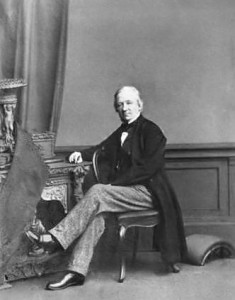Burning Libraries! Two Lost Folklore Collections January 20, 2012
Author: Beach Combing | in : Contemporary, Modern , trackbackHistorical blindspots: every age has them. Take the relative lack of interest in folklore prior to the eighteenth century. When folklore heats up in the later nineteenth century you cannot walk across the parlour without tripping over a book on fairies or witches. This means that anything written before say 1860 is particularly precious and any loss all the more tragic.
Here Beach must introduce Robert Hunt (obit 1887) and a moving preface he penned for the the third edition of his deservedly celebrated Popular Romances of the West of England. Just to give this a chronological edge Hunt was born in 1807 in the prehistory of Cornish folklore. He first published his work in his fifties in 1865 and he came to reflect on how he had put it together in his early seventies in 1881.
There we learn that ‘the beginning of this collection of Popular Romances may be truly said to date from my early childhood. I remember with what anticipations of pleasure, sixty-eight years since [c. 1813 aged six!], I stitched together a few sheets of paper, and carefully pasted them into the back of an old book. This was preparatory to a visit I was about to make with my mother to Bodmin, about which town many strange stories were told, and my purpose was to record them. My memory retains dim shadows of a wild tale of Render the Huntsman of Lanhydrock; of a narrative of streams having been poisoned by the monks; and of a legend of a devil who played many strange pranks with the tower which stands on a neighbouring hill. I have, within the last year endeavoured to recover those stories, but in vain. The living people appear to have forgotten them; my juvenile note-book has long been lost: those traditions are, it is to be feared, gone for ever.’
Here are, as Hunt found, lost worlds. The precious folklore and beliefs of the English counties was slipping away more rapidly than ever before in the early, mid nineteenth century: with railways, national schools and a crumbling squirearchy intervening between Hunt’s youthful collections and his attempts in old age. Oh to lay our hands on those stitched pages… Beach wonders what became of them.
A similar tragedy took place even in the golden age of folklore collection in the early twentieth century. William Paynter (obit 1976) spent much of his twenties ‘witch-hunting, he went to every parish in Cornwall searching out the last generation of witch stories, publishing some in Cornish newspapers which are, thank God, still recoverable if dispersed.
He also though put these stories together in a manuscript entitled Cornish Witches and Wizards or Cornish Witchcraft that seems to have been completed by the early 1930s when he was about thirty. He failed, however, to find a publisher and could not get enough subscribers (those were the days!) to justify publishing independently.
‘The manuscript is now lost and it is presumed to have been destroyed along with most of his other folkloric data.’
A man who knew more about the last generations of belief in witchcraft than anyone else in the south-west, who had spent years travelling to gather every twig from the Cornish broomstick failed to pass on his knowledge to future generations. He ended up, instead, in old age selling dragons blood by post and appearing as a folklore pundit on local television. There are worse fates but not many…
Where are the snows of yesterday?
In the same place, of course, as Hunt’s baby collection and Paynter’s book on Cornish Witches.
Any other lost folklore collections? drbeachcombing AT yahoo DOT com



